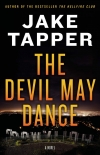The Devil May Dance by Jake Tapper (books to read fiction txt) 📗

- Author: Jake Tapper
Book online «The Devil May Dance by Jake Tapper (books to read fiction txt) 📗». Author Jake Tapper
“Of course, Marco’s in something of a manic state,” Margaret noted. “He wouldn’t be thinking clearly.”
“Yes, the manic state conveyed so subtly by coating my face with petroleum jelly,” Sinatra said.
More than two decades of fame and fortune had done little to smooth the rough edges of Sinatra’s New Jersey origins; there was a combative arrogance to him that reminded Charlie of his dad. Since arriving in Los Angeles, he hadn’t heard from Addington White, didn’t know if his father had been moved to a less harsh prison or how he was doing. He hadn’t felt so disconnected from his father since the war, and given the precarious state in which he’d last seen him, a hum of anxiety was his constant companion.
Sinatra grabbed a towel off the shoulder of a production assistant and rubbed the Vaseline off his face. His makeup guy, a short old man whom Sinatra called “Brownie,” scurried quickly to his boss’s side and offered him a Chesterfield cigarette, the kind the singer helped advertise—Man-Size Satisfaction; Clean, Smooth, Fresh!—and a light. Sinatra inhaled deeply, then turned to the director. “I’ll be in my dressing room when you get your act together here.” He stalked off the set, Brownie following in his wake. As Sinatra walked by an attractive young woman presumably from the wardrobe department—she was carrying three dry-cleaned Chinese army uniforms—he said, “Hiya, doll.” She blushed.
Frankenheimer rolled his eyes. “He’s gifted, but he never has more than one good take in him,” he said dryly. “It’s usually the first one.”
The director reached into his pocket, dug out a pack of Pall Malls, and offered cigarettes to Charlie and Margaret. Smoothly, his lighter appeared in his other hand and he offered them his flame.
Frankenheimer was ascendant. He’d been labeled “television’s boy genius for 1954,” and in 1957, convinced movies were where an artist could take risks, he directed The Young Stranger, a film that everyone pretended to have seen but no one had. Four years later, in 1961, the transition to film was complete with the release of his critically acclaimed “thinking man’s crime drama,” The Young Savages, starring an uncharacteristically restrained Burt Lancaster. Executives saw promise in his craftsmanship and his ability to direct films that could make audiences think while earning studios buckets of money. The wunderkind’s bloodshot eyes and bloated face indicated that he might be equally precocious in his noncinematic pursuits.
Margaret discreetly looked around to make sure no one could hear them.
“Oh, this is hardly a secret,” Frankenheimer said. “Frank himself told me he’s a performer more than an actor.”
“Whatever it is, it was good enough to get an Oscar,” Margaret said.
Some hammering from the corner of the studio reminded Frankenheimer. “Tomorrow we’re shooting the scene on the train,” he said.
“The shell-shock scene,” Margaret said, helpfully reminding Charlie, who was looking blankly at the director. “Marco is blinking, unsteady, hands shaking so much he can’t light a cigarette.” Charlie was glad Margaret was there. She seemed to have memorized the entire script already.
“Have you seen a lot of that among your fellow vets?” Frankenheimer asked.
“I’ve seen battle fatigue manifest itself in all sorts of ways,” Charlie said. “The scenes I read with the nightmares rang truer. To me, at any rate.”
“Do you think it works for the train scene?” Frankenheimer asked. “We need a quick way to telegraph he’s having a rough go of it.”
Charlie stroked his chin. “Sure,” he said. “It’s not just standard battle fatigue that Marco has, right? It’s the brainwash thing.”
“But what would read as more, you know, standard for a veteran?”
“I’ve been married to a veteran for sixteen years, since Charlie got back from France, and I’ve met a ton of veterans since then,” Margaret said. “Washington is lined with them. But those are the ones who came back and instead of healing were determined to keep working, keep moving, never stopping, never slowing down, no time to think, no time to let the mind wander. The whole goal is to keep running, to hide it, to pretend there’s nothing wrong.”
Charlie looked at his wife, who returned his gaze with earnestness. Was she talking about him? Of course she was.
“I have yet to see any veterans in DC with the shakes, with outward signs of pain,” Charlie said. “They—we—put one foot in front of the other like everyone else.”
“I agree with that,” Margaret said. “One foot, then one foot, then one foot, never stopping, because were they to stop, they might feel something they couldn’t stand.”
Frankenheimer was listening intently.
“So maybe Marco has the shakes or maybe he drinks a lot more than he knows is healthy, just grabs it and downs it all the time when no one’s looking, but never enough to stumble or embarrass himself. He drinks the perfect amount so he’s somewhere between numb and bumbling, smooth as China silk,” Margaret added, and Charlie knew that she knew.
“Ready?” United Artists PR honcho Manny Fontaine asked Charlie and Margaret.
Margaret nodded and Charlie shrugged and Fontaine knocked briskly on Sinatra’s dressing-room door, then rested an ear against it to detect signs of movement. He





Comments (0)